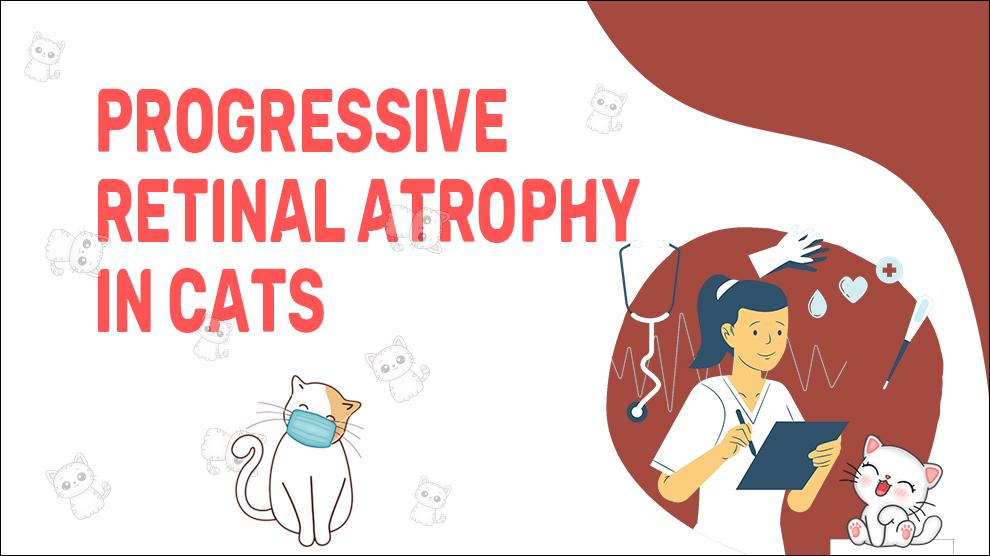What Is Progressive Retinal Atrophy In Cats?
Progressive Retinal Atrophy (PRA) is a group of inherited eye diseases that cause degeneration of the retina in cats.
The condition causes a gradual loss of vision, leading to complete blindness. PRA is a genetic disorder, and it can affect cats of any age or breed.
Early detection and prompt treatment can help slow down the progression of the disease and improve the quality of life for affected cats.
Clinical Signs Of Progressive Retinal Atrophy In Cats
The symptoms of Progressive Retinal Atrophy may not be apparent in cats until they reach 3-5 years of age.
However, some cats may develop symptoms as early as 8 weeks of age.
The following are common symptoms of PRA in cats:
- Night blindness - This is one of the first symptoms of PRA in cats. Affected cats may have difficulty seeing in low-light conditions, such as at night.
- Dilated pupils - Cats with PRA may have dilated pupils, even in bright light.
- Clumsiness - As the disease progresses, cats may become more clumsy and may bump into objects.
- Cloudy eyes - The eyes of affected cats may appear cloudy or hazy due to the degeneration of the retina.
- Loss of peripheral vision - As the disease advances, cats may begin to lose their peripheral vision.
- Complete blindness - In the advanced stages of the disease, cats may become completely blind.
Treatment Options For Progressive Retinal Atrophy In Cats
There is no cure for Progressive Retinal Atrophy, but there are treatments available to slow down the progression of the disease and improve the quality of life for affected cats.
These treatments include:
- Antioxidant supplements - Antioxidants such as Vitamin E and Vitamin C have been shown to slow down the progression of PRA in some cats.
- Omega-3 fatty acids - Omega-3 fatty acids can help reduce inflammation and may slow down the progression of PRA.
- Surgery - In some cases, surgery may be able to restore some vision in cats with PRA.
- Environmental modifications - Making changes to the environment can help cats with PRA navigate their surroundings more easily. This includes providing ramps and other aids to help them get around.
Home Remedies For Progressive Retinal Atrophy In Cats
There are no home remedies for PRA, and it is important to seek veterinary care if you suspect your cat may have the condition.
However, you can take steps to help your cat adjust to their changing vision, such as keeping the environment consistent and using familiar scents to guide them.
How To Prevent Progressive Retinal Atrophy In Cats?
Prevention of Progressive Retinal Atrophy involves genetic testing and breeding only cats that are free of the PRA gene mutation.
It is important for breeders to test their cats for PRA and only breed cats that are clear of the gene mutation.
Pet owners should also consider genetic testing before adopting a cat, especially if they are adopting a purebred cat that may be prone to PRA.
Affected Cat Breeds Of Progressive Retinal Atrophy
Causes For Progressive Retinal Atrophy In Cats
Causes:
Progressive Retinal Atrophy is caused by genetic mutations that affect the retina's ability to function properly. There are several different types of PRA, each caused by a different gene mutation.
Some of these mutations are inherited in an autosomal dominant pattern, while others are inherited in an autosomal recessive pattern.
When To See A Vet For Progressive Retinal Atrophy In Cats?
If you notice any changes in your cat's vision, it is important to schedule an appointment with your veterinarian as soon as possible.
They can perform a thorough eye exam to determine if PRA or another condition is affecting your cat's vision.
Early detection and intervention can help to slow the progression of PRA and improve your cat's quality of life.
Food Suggestions For Progressive Retinal Atrophy In Cats
While there is no specific diet that can prevent or treat PRA, feeding your cat a balanced and nutritious diet can help support their overall health and well-being.
Your vet may recommend a diet that is rich in antioxidants and omega-3 fatty acids, which can help protect the eyes and slow the progression of the disease.
Conclusion
Progressive retinal atrophy is a serious condition that can greatly impact a cat's quality of life.
While there is currently no cure for PRA, early detection, and intervention can help to slow the progression of the condition and improve a cat's quality of life.
By working with a veterinarian to develop a management plan, providing a safe and familiar environment, and considering selective breeding practices, we can help to reduce the prevalence of PRA in future generations.











